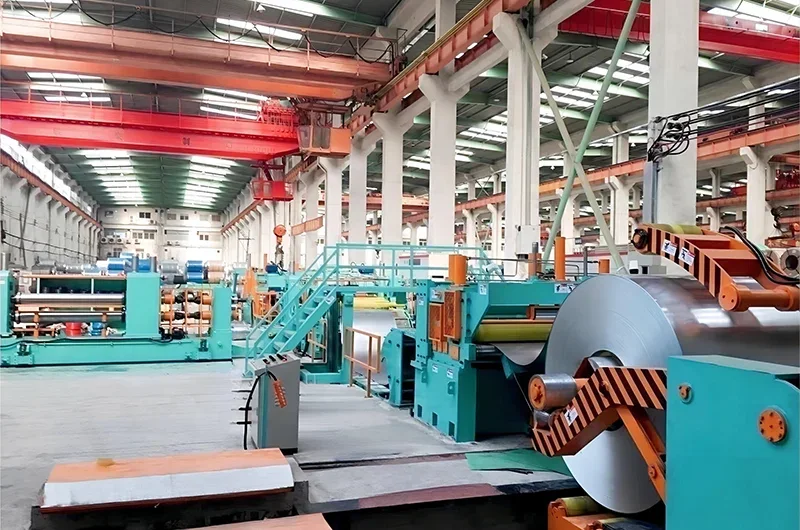Choosing the Right Supplier for Metal Coil Slitter Rewinders: A Comprehensive Guide
Sep 16,2025

Choosing the Right Supplier for Metal Coil Slitter Rewinders: A Comprehensive Guide
As industries evolve, the demand for high-quality, efficient metal processing machinery continues to rise. Among the essential equipment in metal fabrication is the metal coil slitter rewinder, a tool crucial for converting large metal coils into smaller, manageable widths. However, selecting the right supplier for metal coil slitter rewinders is paramount to achieving operational efficiency and maintaining product quality. In this guide, we will explore the critical aspects to consider when choosing a supplier and how these elements can impact your manufacturing processes.
Table of Contents
- Understanding Metal Coil Slitter Rewinders
- The Importance of Selecting the Right Supplier
- Key Criteria for Evaluating Suppliers
- Experience and Reputation
- Technological Capabilities
- Customization Options
- After-Sales Support and Service
- Cost Considerations
- Supplier Location and Logistics
- Emerging Trends in Metal Processing Technology
- Maintaining Your Metal Coil Slitters
- Frequently Asked Questions
Understanding Metal Coil Slitter Rewinders
Metal coil slitter rewinders are sophisticated machines designed to cut large rolls of metal into narrower strips. They play a vital role in various industries, including automotive, aerospace, and construction. Understanding the functionality and operation of these machines is crucial when selecting a supplier. These machines typically consist of a slitting head, tension control systems, and rewinding units. The quality of these components influences the efficiency and precision of the cutting process.
The Importance of Selecting the Right Supplier
The supplier you choose can significantly impact your overall production quality and operational efficiency. A reliable supplier ensures that the machinery meets industry standards, offers suitable technical support, and maintains spare parts availability. Poor supplier choices can lead to production delays, increased costs, and compromised product quality. Therefore, investing time in evaluating potential suppliers is essential for long-term business success.
Key Criteria for Evaluating Suppliers
When it comes to selecting a supplier for metal coil slitter rewinders, several key criteria should be considered:
Experience and Reputation
A supplier with extensive experience in the field is more likely to offer reliable machinery and optimal support. Evaluating a supplier's reputation can be done by checking customer reviews, industry recognition, and case studies. A well-regarded supplier is often a sign of quality assurance.
Technological Capabilities
The advancement of technology in metal processing equipment is rapid. Suppliers offering the latest technology in slitter rewinders can enhance efficiency and precision. It's crucial to assess the technological capabilities of potential suppliers, including automation features, control systems, and integration possibilities with existing manufacturing setups.
Customization Options
Every manufacturing operation has unique requirements. It’s essential to choose a supplier who offers customization options to tailor the slitter rewinder to your specific needs. This could include adjustments in width, cutting speed, and additional features that enhance usability.
After-Sales Support and Service
After-sales support is a critical criterion when choosing a supplier. A reputable supplier should offer comprehensive training for staff, maintenance services, and readily available spare parts. The availability of support can significantly reduce downtime and increase operational efficiency.
Cost Considerations
While it may be tempting to opt for the cheapest option, assessing the overall value is more important. Consider the initial purchase price, long-term operational costs, maintenance expenses, and potential downtime costs when evaluating suppliers. A higher upfront investment in a quality machine can lead to greater savings over time due to efficiency and reliability.
Supplier Location and Logistics
The location of the supplier can affect logistics, shipping costs, and lead times. Suppliers located closer to your facilities can often provide quicker delivery and more accessible service support. Understanding the logistics involved with a supplier can play a crucial role in your decision-making process.
Emerging Trends in Metal Processing Technology
Staying abreast of technological advancements is essential. Innovations in automation, artificial intelligence, and data analytics are becoming increasingly relevant in metal processing. Selecting a supplier who actively adopts and integrates these technologies can provide a significant competitive edge in the market.
Maintaining Your Metal Coil Slitters
Proper maintenance of your metal coil slitter rewinders is vital to ensure longevity and optimal performance. Regular inspections, timely servicing, and adherence to the manufacturer’s maintenance guidelines can prevent costly breakdowns and ensure consistent product quality.
Frequently Asked Questions
1. What factors should I consider when choosing a supplier for metal coil slitter rewinders?
Consider the supplier's experience, reputation, technological capabilities, customization options, after-sales support, and cost.
2. How can I evaluate a supplier's reputation?
You can check customer reviews, industry awards, and case studies to gauge a supplier's reputation.
3. Are customization options important when selecting a supplier?
Yes, customization options allow you to tailor the equipment to meet your specific manufacturing needs.
4. What is the significance of after-sales support?
After-sales support is crucial for maintenance, troubleshooting, and ensuring minimal downtime.
5. How can emerging technologies impact my choice of supplier?
Suppliers who incorporate emerging technologies may offer more efficient and advanced equipment, providing a competitive edge.
Conclusion
Choosing the right supplier for metal coil slitter rewinders is a decision that can shape the future of your manufacturing processes. By considering key criteria such as experience, technological capabilities, customization options, and after-sales support, you can ensure that you partner with a supplier that meets your operational needs. Investing the time and resources into this decision will pay off in the form of increased efficiency, reduced downtime, and enhanced product quality, all of which are essential for maintaining a competitive edge in the metal processing industry.
PREVIOUS:
Articoli recenti






